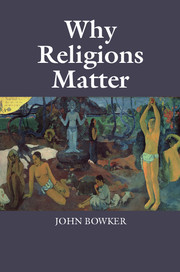Book contents
9 - Understanding religions
III Ritual and the human imagination of death
Published online by Cambridge University Press: 05 April 2015
Summary
The poet George Barker once observed: “There are two things a poet can write about, death and sex – some call it love. No one knows anything about death, so I write about sex.”
Religions, on the other hand, often give the impression that they know all that needs to be known about sex and prefer to talk about death. From their point of view, it is not true that ‘no one knows anything about death’. In Asian religions the belief in rebirth means that a memory of previous lives and deaths is unsurprising. It is, for example, taken for granted in the Tibetan Book of the Dead (Bardo Thödol):
In contrast to the assumption that no one can tell us anything about what happens after death because no one has ever come back from death, Bardo Thödol (and Tibetan belief in general) insists that everyone has come back from death, or at least come through death, and that consequently there is much that we know about it. Part of that knowledge is contained in Bardo Thödol.
(Bowker 2011, p.285)Short of remembering the experience of death, there is still much that we know about death. We know, for example, a great deal about the statistics and the distribution of death; we know much more than we did in the past about the many different ways in which death brings life to an end. For that reason alone we can postpone the occasion of death far more extensively than any generation before us.
- Type
- Chapter
- Information
- Why Religions Matter , pp. 239 - 272Publisher: Cambridge University PressPrint publication year: 2015



